CATE TUCKER
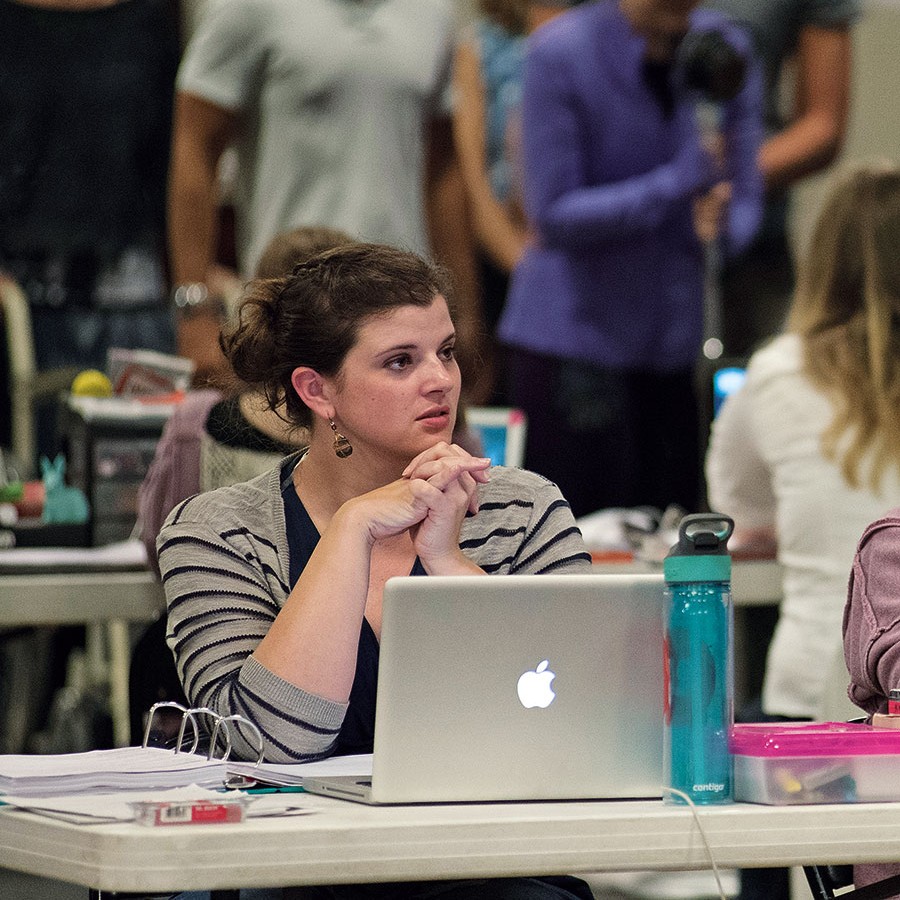
Profession: Production stage manager
Hometown: Bend, Ore.
Current home: Austin
Known for: She stage-managed Caroline, or Change in 2008 and Red Hot Patriot: The Kick-Ass Wit of Molly Ivins in 2011 (“a phenomenal one-woman show by Peggy and Allison Engel and starring my brilliant aunt, Barbara Chisholm”), both at ZACH Theatre in Austin; in 2012 she was on the stage management team for Ragtime, ZACH’s inaugural production in the Topfer Theatre; and she worked with ZACH producing artistic director Dave Steakley on his new adaptation of A Christmas Carol, which debuted in 2014 and had a return engagement during the following holiday season.
What’s next: At ZACH, she’ll be the production stage manager for Tribes (Jan. 27–Feb. 28), assistant stage manager for Ann (April 6–May 15), then PSM again for One Man, Two Guvnors (June 1–26) and Mary Poppins (July 20–Sept. 4)
What makes her special: As noted above, Tucker’s aunt is the well-known Austin performer Barbara Chisholm, who mentioned her young niece to ZACH’s Dave Steakley after she’d graduated with a stage management degree and had finished a season at the Oregon Shakespeare Festival. Tucker’s first job at ZACH, a production of Disney’s High School Musical on the Texas School for the Deaf campus, was “truly a test by fire, and Cate passed with flying colors,” Steakley recalls. He adds: “She is invested in the artists, and whether the actor is in their first professional show or is a Tony-winning actress, Cate forms personal relationships that make casts feel well taken care of, respected, and treasured. I love that Cate is a big Shakespeare nerd, and values great writing, and embraces new work with gusto, and has the same commitment to lighthearted musical entertainments. Directors dream of production team members with whom they share an artistic/emotional/spiritual connection, that creates a shorthand of communication in rehearsal and tech…That’s what I enjoy with Cate, and I’m the better for it.”
On getting into theatre: Tucker comes from a family of theatre lovers and makers. When she was 5, they took her to see her aunt in a theatre-in-the-park staging of Love’s Labour’s Lost. “My mom discovered I had wandered away from our picnic blanket,” Tucker recounts. “She looked for me at the nearby playground, but I wasn’t there. When she came back she found I had crawled through the audience and was sitting on the front edge of the stage, completely caught up in the play. I’ve been in love ever since!”
DAVID RYAN SMITH
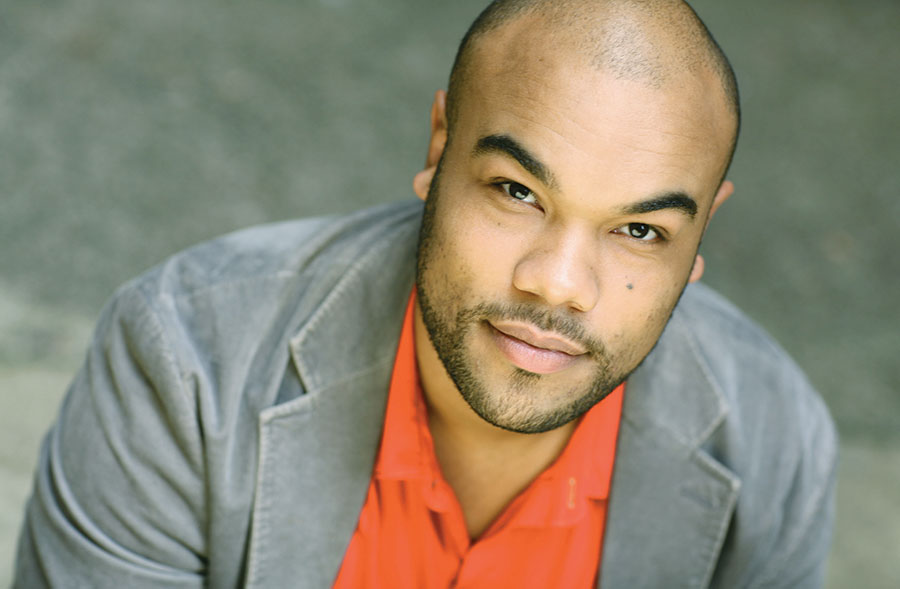
Profession: Actor
Hometown: Asheville, N.C.
Current home: New York City
Known for: Smith was in the original Broadway cast of One Man, Two Guvnors; he appeared at the 2014 Humana Festival at Kentucky’s Actors Theatre of Louisville in Jordan Harrison’s The Grown-Up, and at Humana 2015 in Charles Mee’s The Glory of the World; in the past few years, Smith has appeared in Pericles, Prince of Tyre and The Comedy of Errors, both in New York City with the Public Theater’s Mobile Shakespeare Unit.
What’s next: He’s reprising his role in The Glory of the World Jan. 16–Feb. 6 at Brooklyn Academy of Music under the direction of Les Waters.
What makes him special: “David, quite frankly, is a wizard; he possesses magic,” raves Center Stage artistic director Kwame Kwei-Armah, who directed Smith in The Comedy of Errors at the Public. “The joy of working with him is to observe how he creates his character layer by layer, day by day, and then, boom! The miracle appears. But the even greater thing is, the magic never stops, the craft just keeps on working..”
The friend who inspired him: “The first play I ever saw was The Fabulous Fable Factory in third grade,” Smith recalls. “My friend Matthew was in it, and he came to our school and performed it. It was like everything aligned. I had been doing this already with my friends in my neighborhood, but I didn’t know there was actually an organized version of it.” Later he began doing plays at the University of North Carolina at Asheville with a children’s company called Tanglewood Youth Theatre. He still honors his inspiration: “Matthew has since passed away, so my opening-night tradition is to give thanks to him—if I had never met or seen him perform, I couldn’t possibly have had the great ride that I’ve had.” That ride included a stint at the University of Evansville in Indiana, which Smith calls “one of the best schools that exists for a career in theatre. That is where I got the meat and potatoes of my training.” He then attended American Conservatory Theater. Between the two he learned “the scope of what theatre is. It is important to go to a place that teaches you the full breadth of the experience. I think it’s important to know the ushers, the person hanging the lights, the stage manager (who is the most important person)…to just know everybody. You’ve got to know everybody to really appreciate and to do the best work.”
GINA PISASALE

Profession: Dramaturg
Hometown: Born in Pusan, South Korea, she was adopted and raised in Drexel Hill, Pa., a suburb of Philadelphia
Current home: Media, Pa.
Known for: Currently the resident dramaturg at People’s Light in Malvern, Pa., she was previously a fellow, then a resident at the Oregon Shakespeare Festival
What’s next: The remaining People’s Light season includes Sense and Sensibility (Feb. 10–March 20), Richard III (March 16–April 24), and Robert Schenkkan’s adaptation of Linda Sue Park’s novel A Single Shard (April 27–May 29). This summer she’ll return to OSF to work on Desdemona Chiang’s production of The Winter’s Tale (June 9–Oct. 16), in which Sicily will look a lot like Han Dynasty China and Bohemia like the American frontier.
What makes her special: Chiang raves that Pisasale is “fiercely intelligent without all the trappings of academic pretense…Gina will often say something like: ‘Okay, I have this note that won’t do anything unless you’re writing your grad school dissertation…but I think this other note I have will actually help in rehearsal.’ She knows the difference between ideology and execution.” Sarah Rasmussen, the new artistic of Minneapolis’s Jungle Theater, worked with Pisasale on OSF’s all-female Two Gentleman of Verona in 2014, and found her “a director’s dream dramaturg…She makes dramaturgy deeply relevant to the hands-on process of creating a play.” How, exactly? “She risks truly being a part of the team,” says Rasmussen. “She is present from first design meetings through late post-tech conversations. Her courage and candor encourage others to feel more free to be themselves. And she has the biggest, best laugh in American theatre.”
The room where it happens: Pisasale started in theatre “like most people, trying to be an actor and a director, but as a minority I found that incredibly reductive in terms of opportunities—being told what my place was in the field.” Such condescension stuck in her craw not only, she says, because “theatre is supposedly this liberal bastion,” but also “because I have this Philly fight in me, which made me feel: ‘You can’t tell me what to do!’” After sampling directing and design, she discovered that dramaturgy was her best way into the discussions she craved: the ones about “who is invited into the room and who has authority to speak, especially in terms of race and culture. I love being in the room when those conversations are happening.”
MARTI LYONS
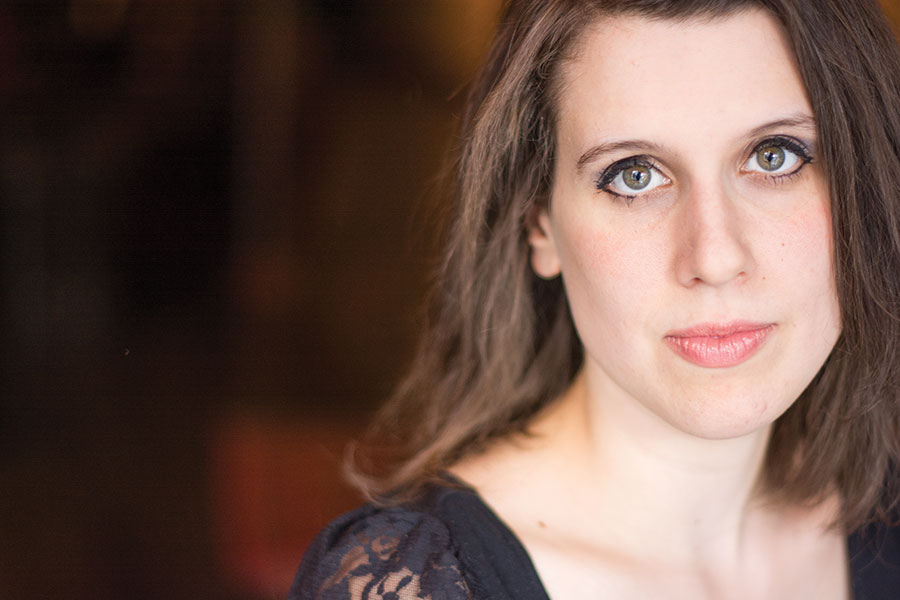
Profession: Director
Hometown and current home: Chicago
Known for: Directing Title and Deed, starring Michael Patrick Thornton, at Lookingglass Theatre Company in 2015; ensemble member of the Gift Theatre Company; artistic associate at Sideshow Theatre Company; 2015 Michael Maggio Directing fellow at Goodman Theatre.
What’s next: Directing David Jacobi’s Mai Dang Lao at Sideshow (March 6–April 10) and developing and directing Wondrous Strange, by Martyna Majok, Meg Miroshnik, Jiehae Park, and Jen Silverman, for the Humana Festival of New American Plays at Actors Theatre of Louisville. “The piece will feature the theatre’s stellar apprentice company,” Lyons says. “Our production is focused on a theme of ‘hauntings,’ so we’ve had a great time terrifying ourselves while investigating the otherworldly.”
What makes her special: Kimberly Coburn, literary director at South Coast Repertory in Costa Mesa, Calif., calls Lyons “a playwright’s director, with a voracious appetite for grappling with contemporary plays. She’s willing to take the risk of being open to where the work leads her, starting with thoughtful questions rather than making assumptions.” Michael Halberstam, artistic director of Writers Theatre in Glencoe, Ill., says Lyons is “interested and engaged in conversations about her work, and she wants to find ways to make it better so there are no defense mechanisms one has to defuse before being able to approach complex feedback.”
Why she does what she does: While working with Will Eno on Title and Deed, Lyons recalls that the playwright told her that “his work may not be for everyone, but in every audience there might be one person whose life the show saved for a night. I can think of so many nights, beginning in adolescence, when I felt isolated or disconnected until I sat in a dark theatre, surrounded by others, and something onstage resonated so deeply that I suddenly felt known…Reaching even one person in the dark of a theatre who is experiencing a deep human questioning or suffering still feels one of the most redemptive and connecting endeavors possible.”
MATT STINES
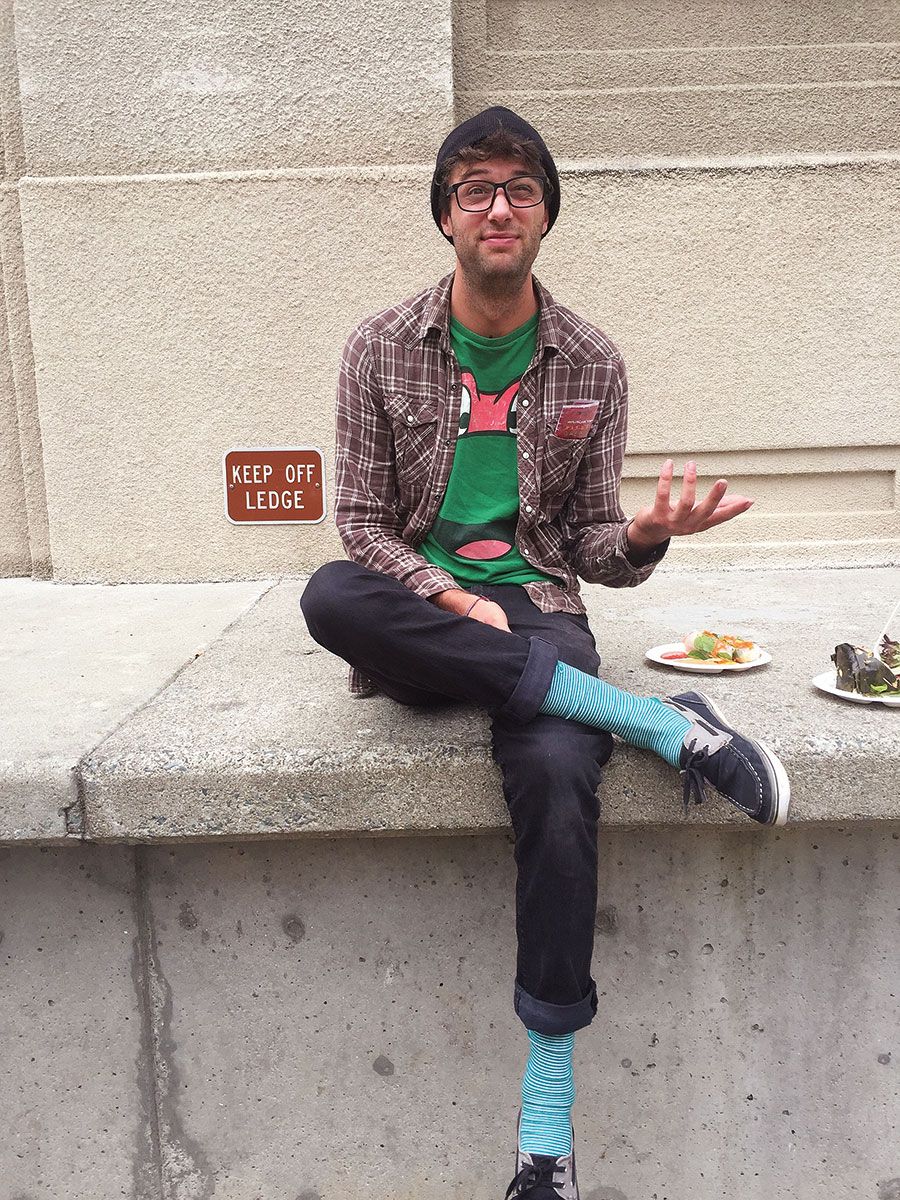
Profession: Sound designer
Hometown: Millbrae, Calif.
Current home: Oakland, Calif.
Known for: Designing sound for Metamorphosis at Berkeley, Calif.’s Aurora Theatre Company in 2011 and Eurydice at Berkeley’s Shotgun Players in 2015.
What’s next: Designing sound for Hamlet at Shotgun Players, which runs April 9–May 15. “The actors draw character names out of Yorick’s skull the night of a performance and have to play that role. So each actor learns each character track that we’ve devised,” Stines says. “This means that in any given performance a middle-aged man could very well draw Ophelia and a gal in her 30s might play her dad, and that’s just a fraction of the possibilities. That’s what makes the the prospect of the sound design so exciting—for every element, this is not about seeing a production of Billy Shakes’s The Tragedy of Hamlet, Prince of Denmark for the thousandth time, but rather witnessing the possibilities of it, and by extension, of live theatre.”
What makes him special: “Matt really understands the significant role sound can play in theatre, and the time commitment needed to make a sound design truly organic and integral to a production,” says playwright/director Mark Jackson, a frequent collaborator. “I trust him implicitly because I know he’s there to help make the show, not just his part in it. Also he’s a very genuine, responsive, open, and weirdly funny human being.”
How he finds his groove: Stines was initially interested in music, and isn’t exactly sure why he turned to theatre—“I simply followed an instinct,” he says. While studying at San Francisco State, he realized the theatre department lacked good sound design, and says he really learned how to collaborate in the rehearsal room in the school’s production of Machinal. “Where possible, I’ve attended more rehearsals than I probably need to, because there’s something to be said about grooving with the piece you’re a part of. It’s not about how ‘clean’ your sound is. It’s not about how skilled a composer you are. And it’s not about the newest, flashiest gear to pipe it through. Yes, these factors have weight of their own, but it’s nothing without the energy with which you approach your work. And I believe you best accomplish that in the room of creation.”
RACHEL BONDS
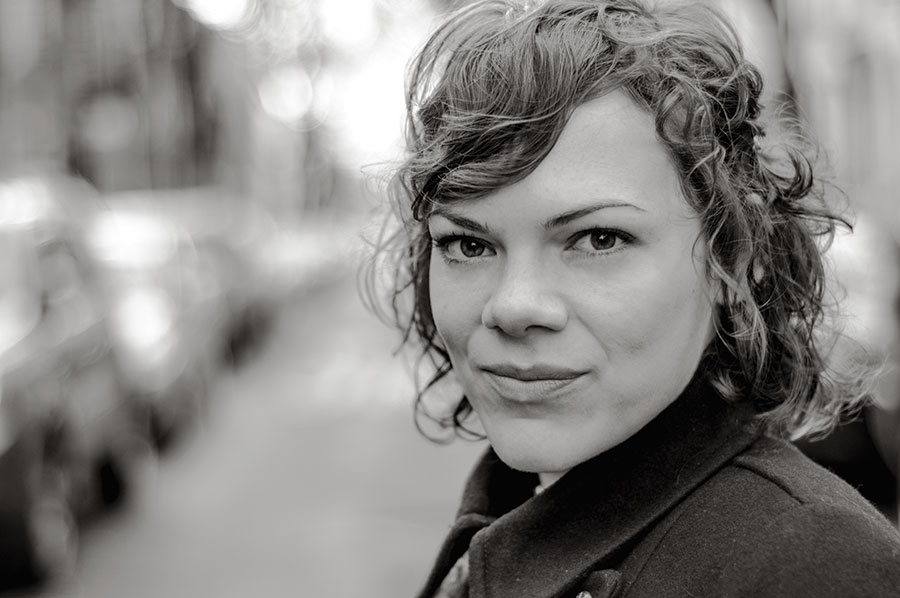
Profession: Playwright
Hometown: Sewanee, Tenn.
Current home: New York City
Known for: Five Mile Lake at McCarter Theatre Center in Princeton, N.J., in 2015; The Wolfe Twins at Washington, D.C.’s Studio Theatre (which made the 2015 Kilroys List of plays by female and transgender playwrights).
What’s Next: Swimmers at Mill Valley, Calif.’s Marin Theatre Company (March 3–27). Also, she’s currently working on a play with music, Rez, a collaboration with Brooklyn-based folk-rock band the Bengsons and Anne Kaufman, at NYC’s Ars Nova; and commissions from South Coast Repertory (Curve of Departure) and an untitled piece for McCarter.
What makes her special: McCarter artistic director Emily Mann, who staged Five Mile Lake, revisits her first reaction to the play. “I fell in love with the script immediately: I was deeply moved by the story and astounded by Rachel’s facility with language. It was clear that she was an original voice and an accomplished writer. The play itself captures life in a small town for a generation of young characters, coming of age in a way that feels completely contemporary, but also universal. I saw my own young adulthood reflected in the finely drawn characters and the complex, original relationships.” Mann recalls of the process of staging it, “As soon as the process was finished, I wanted to work with Rachel again…I believe that she has so much more to say, and it brings me great joy to support and champion her work as she emerges as one of our major playwrights.”
Where her plays come from: In the middle of her sophomore year at Brown, Bonds’s father died. In her grief, Bonds turned to writing: “I wrote a lot of essays and a lot of strange, probably terrible monologue-plays about grief and all of its odd, dark corners. Partly to escape, once again, and partly to figure out how to somehow move forward,” she says, adding, “I’m still always writing about grief. I cannot seem to get away from it. Every time I think I’ve successfully written a play that does not contain my father, of course there he is, in a joke or a story or an image—there he is. I guess the Irish half of me is a little obsessed with ghosts. And the Jewish half of me wants to honor the dead.” Bonds’s plays aren’t all sadness, though; as she puts it, “I like to write from that funny place where sadness and humor overlap.”


